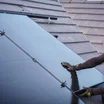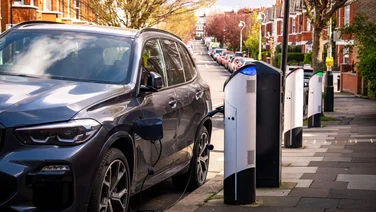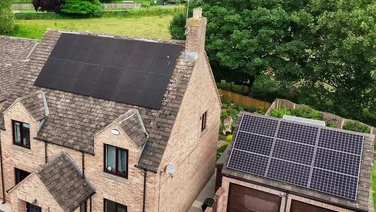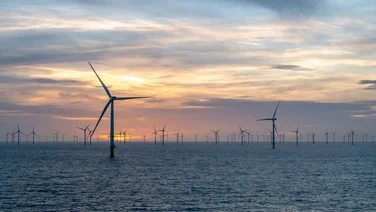We receive a small fee from trusted installers when you request a quote through our site. This helps us keep our content independent, well-researched and up to date – Learn more

- IPPR says Chancellor should invest more in solar and other clean energy
- Removing unnecessary levies would also help
- Citizens Advice urges government to not break its promises
Rachel Reeves has been urged to “declare war on bills” when she delivers her Budget at the end of the month by removing levies and investing more in solar, batteries and electric vehicles (EVs) by the think tank the Institute for Public Policy Research (IPPR).
In a new policy paper, the IPPR ranked the price of energy alongside reducing the cost of food as the biggest priorities, as polling consistently shows these are the two biggest concerns for consumers.
You might be eligible for free solar panels. Check our guide on government grants for solar panels to find out.
The think tank said the government should start off by removing levies that are “not serving a clear purpose”, such as the Climate Change Levy – a charge placed on businesses to encourage carbon cutting – which it said does little to help decarbonisation.
Another path is NOT cutting VAT on energy bills. Getting rid of VAT would do little to help fuel-poor households, and the £2.5 billion it raises annually should instead be used to “subsidise electricity”.
On top of that, the IPPR also called for more money for solar panels, batteries and EVs, which will lower the cost of clean technology and be the “route to lower bills”.

Get free solar panel quotes
Answer a few quick questions, and our trusted installers will send you bespoke solar panel quotes – for free.
As well as taking action against bills, the government needs to be more open with the public about what it is trying to do to bring bills down. The IPPR said the government should consider setting up a ‘war on bills cabinet’ to not only focus on consumer needs but also to show the government is actively trying to make life more affordable.
Sam Alvis, the IPPR’s associate director for the environment and energy security said that a government that “declares war on bills” can show it’s “fighting on the side of working people”.
“Small but visible actions, repeated over time, are the best way to prove that the government can make life fairer and more affordable,” Alvis said.
Carsten Jung, IPPR associate director for economic policy, insisted that there are a “number of levers the government can pull to lower the cost of living”.
“In many domains, consumers are not getting a fair deal – being charged unfair prices and not being given the transparency to make informed choices – the government could lower energy bills and notify them of any reduction,” Jung commented.
What else could the government do to bring down energy bills?
This is a huge question, and it’s unclear what Rachel Reeves will do. The one thing that appears certain is that she will increase taxes, but it’s hard to say how this will affect energy bills.
It is possible that a tax hike could mean fewer levies on electricity bills. These levies are partly responsible for electricity being four times the price of gas, a phenomenon known as the ‘Spark Gap’.
Whether or not she will do this though is still a big a question. The most recent rumours are that the government has U-turned on its idea to increase income taxes, which suggests there will be little movement on the Spark Gap.
There are also other reports that the Chancellor will scale back the Boiler Upgrade Scheme, the government’s key initiative to help people install heat pumps.
If you’re thinking about getting a heat pump, now’s the time to act. Read our page on the Boiler Upgrade Scheme here or fill in the form below to get started.

Get £7500 towards your heat pump installation through a trusted installer
An MCS-certified heat pump installer can apply for the Boiler Upgrade Scheme on your behalf, get a quote from one now
Cutting VAT has also been rumoured, but this is unlikely to bring down bills for poorer households, and as the IPPR have suggested, the funds it raises could be better spent, either on government grants for solar panels or investment into the national grid.
Whatever decision Rachel Reeves chooses to make, it is vital she uses the Budget to make energy bills cheaper for households and is clear about how government policy will make this happen.
When contacted by The Eco Experts, Gillian Cooper, director of energy at Citizens Advice, said the government should not row back on its pre-election promise to make more homes energy efficient because it would “risk trapping people in a cycle of paying over the odds to heat cold, draughty homes”.
“Before winter’s even hit, people are coming to us for support because they can only afford to heat one room, are wearing gloves inside to stay warm, and have damp and mould creeping up the walls.
Cooper said the Warm Homes Plan is a chance to “repair trust after previous energy efficiency schemes have gone wrong”, with tough new rules to protect people from rogue traders and dodgy installations.
“Bringing down energy bills is essential but the government should look for savings elsewhere,” she explained.
“Moving some of the costs of net zero off bills and into general taxation, or spreading them more evenly between gas and electricity could save hard-up households hundreds of pounds a year.”

Get free solar panel quotes
Answer a few quick questions, and our trusted installers will send you bespoke solar panel quotes – for free.








